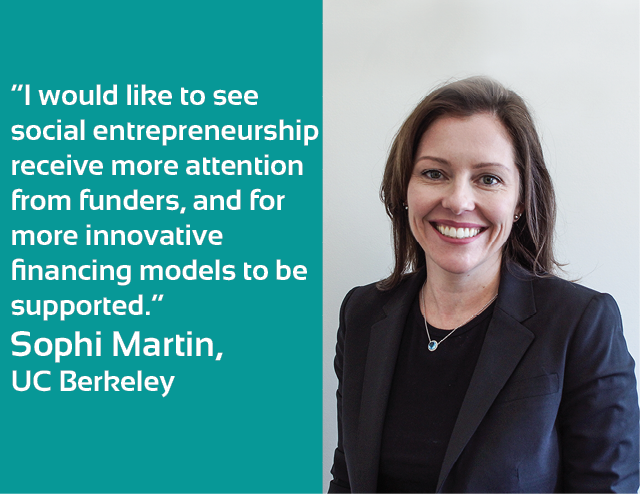
We continue our series highlighting educators within the VentureWell network who are doing good work—faculty members who are catalyzing change in higher education and inspiring students to impact the world through invention.
This month’s faculty spotlight is Sophi Martin, Innovation Director at University of California-Berkeley Blum Center for Developing Economies. She leads the university’s new Development Engineering program, an interdisciplinary research-based training initiative that prepares students to develop, pilot, and evaluate technological innovations designed to improve human and economic development within complex, low-resource settings. Martin is an active member of the VentureWell community, serving as a Principal Investigator for a Faculty Grant and a presenter at our OPEN conference.
How did you get interested in teaching entrepreneurship?
When I started at the Blum Center, I was recruited to be an advisor and judge for Big Ideas, an annual student innovation and entrepreneurship contest that attracts about 1,000 students from 11 campuses each year. In that role, I had the opportunity to spend time with students who are just beginning their innovation journey. It was such a rewarding experience to advise students who are passionate about changing the world for the better.
What is your favorite thing about teaching?
Student passion and enthusiasm. Many of my students are coming from a place of personal experience with poverty or inequity in their own communities, and most are determined to use their college education to create real change in the world.
Where would you like to see the field of entrepreneurship in five years?
I would like to see social entrepreneurship receive more attention from funders, and for more innovative financing models to be supported. Right now, a key challenge is a lack of consensus on what “success” looks like, especially in diverse portfolios. Once we can develop and agree upon a set of measures for social impact, I believe the funding models will grow as well.
What traits make for great teachers, advisors, and mentors?
Listening. In four years of advising teams, I’ve learned that spending time understanding the context and underlying details of the problem is crucial. It is the difference between making progress toward solving a problem and repeating a failed solution.
What books on entrepreneurship and innovation have you been reading lately?
Teaming: How Organizations Learn, Innovate, and Compete in the Knowledge Economy by Amy C. Edmondson has dramatically changed my approach to teaching innovation and entrepreneurship. It’s a series of case studies on what makes for effective teams, and the role effective teams play in innovation.
What’s your most useful classroom activity or assignment?
A key exercise in my courses is the team update. Each team gives a weekly status report to the class, and the rest of the class asks questions and offers suggestions. The process encourages students to support one another in the development of their ideas, and build a sense of psychological safety across the cohort. The reporting also keeps the teams honest, not just with the instructors, but with themselves.